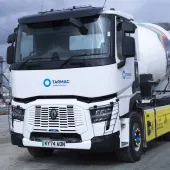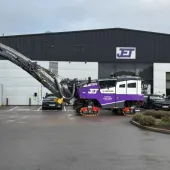Four Renault trucks for AABC Bagging Ltd

Customer service and payload advantages key factors in new Range T vehicle selection
AABC Bagging Ltd, part of Stevenage-based AABC Group, have taken delivery of four 44-tonne Renault Range T460.26 low-cab tractor units as the latest additions to their 20-strong fleet.
The new Range Ts, supplied by Renault Trucks Chiltern, are being used to deliver bagged and bulk aggregates from AABC’s new depot and quarry in Sipson, near Heathrow, to major UK builders’ merchants across Norfolk, Suffolk, Essex and Hertfordshire, as well as north and west London.
The Range Ts, fitted with Freuhauf tipper bodies, carry 30 tonne payloads – some 1.5 tonnes more than competitor marques on the fleet.
And following the successful introduction of the new Range Ts, a further two Range T460s are also on order.
According to AABC partner Rick Faulkner, favourable experiences with Renault trucks and excellent customer service at Renault Trucks Chiltern, in Dunstable, were key factors in selecting the new vehicles.
‘I’m a mechanic by trade, so I know that the Range T is a great vehicle, and the 13 other Renault trucks in our fleet have given us impressive performance,’ he said. ‘I know all the guys at Dunstable really well and they are a very skilled bunch. They are always ready to help and give a level of service that is second to none.’
Mr Faulkner continued: ‘Our site near Heathrow is pulling out over a million tonnes of materials, so we need trucks that are robust and up to the job. We also like the fact that the lighter Range T gives us a very impressive payload. All in all, I am really happy with both the trucks and service provided by the Renault Trucks team.’
Commenting on the deal, Matthew Deanus of Renault Trucks Chiltern said: ‘I am delighted to hear that Rick is so pleased with the Range T and that the trucks are contributing in such a positive way to AABC’s business. We understand that our customers need reliable vehicles that won’t let them down and I look forward to working with AABC on any requirements they may have in the future.’









